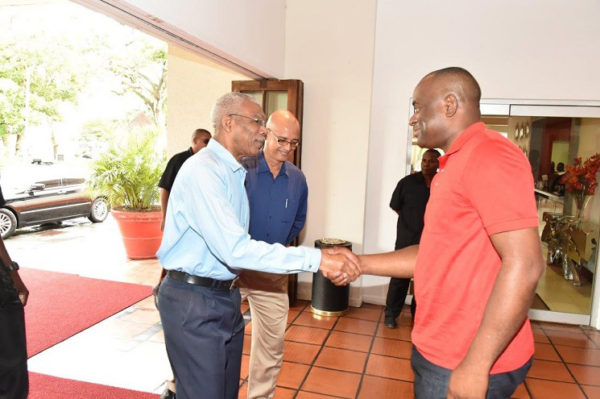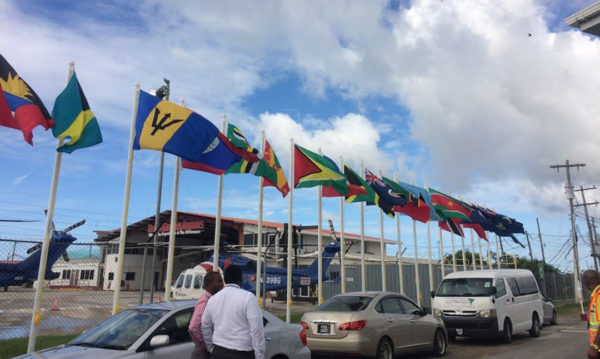CARICOM Heads of Government will meet for their 37th Regular Meeting from today in Georgetown and observers say that a key topic for discussion will be Britain’s shock withdrawal from the European Union (EU) and its implications for the region.
The opening ceremony for the July 4th to 6th meeting is scheduled for 5 pm today at the National Cultural Centre.
President David Granger is among the leaders listed to address the opening ceremony, according to an advisory from CARICOM. Guyana is co-hosting the meeting with the CARICOM Secretariat as Dominica was unable to do so because of the damage wrought by Tropical Storm Erika last August.

The meeting will also be addressed by two new prime ministers: Andrew Holness of Jamaica and Allan Chastanet of St Lucia. The other leaders to address are St Vincent and the Grenadines Prime Minister Dr Ralph Gonsalves, Trinidad and Tobago Prime Minister Dr Keith Rowley and Suriname’s President Desi Bouterse. CARICOM Chairman, Dominican Prime Minister Roosevelt Skerrit and CARICOM Secretary General Irwin LaRocque will also make presentations.
Britain’s unexpected vote, the so-called Brexit, on June 23rd to leave the EU has left much turmoil in its wake and questions about the impact of its departure on CARICOM.
Writing in the Sunday Stabroek yesterday, columnist David Jessop noted that there are four options for Britain in its future relations with the EU and each of these have ramifications.
“For the Caribbean each alternative has implications and in due course each would eventually require the region to undertake a trade negotiation with the UK. Unfortunately, it is far from clear which of these avenues might be taken by Britain. This is because the UK referendum was won without any idea by those who wanted to leave Europe as to what should happen next; meaning that whoever comes to lead Britain’s Conservative Party will rapidly have to propose a plan…
“What appears to be not well understood in the region is that despite the strategic implications of the UK’s decision to leave Europe, this means nothing structural will happen suddenly. Moreover, the Caribbean’s relationship with a Europe of 27 member states on trade, through the Economic Partnership Agreement (EPA), already programmed development support and all else will continue unchanged far into the future.
“Despite this, the Caribbean cannot avoid or wait to take decisions on rebalancing its relationship with Europe. Losing Britain’s voice in the councils of Europe means that the region will rapidly need to develop viable new political allies, most notably in France, Spain and the Netherlands. In doing so it will also have to calibrate the relative future weight it intends placing on North America, and the many new global relationships that it has developed.
“All of which requires resolution at a time when Caribbean unity is doubtful, Caricom has divided itself from its large Hispanic neighbour, the Dominican Republic, a country which enabled it to meet substantially all the trade requirements of the Economic Partnership Agreement with Europe, and when most of its trade with, and visitor flows from Europe, remain with the United Kingdom”, Jessop said.
He added that the fact that the UK vote has created existential concerns in the region speaks volumes about all that has been allowed to drift and has not been addressed.
“It is a moment that requires the region to find the clarity that it has lacked for more than a decade as to where it is heading and where it sees its future as a region. That is to say it requires Caricom to look beyond the anglophone part of the region and recognise that as Cariforum with the Dominican Republic and Cuba and the Overseas Territories ? which are now in a deeply anomalous place – there is a basis on which the region might have a critical economic mass; one that could more viably re-engage with Europe, and with a separated and possibly diminished UK, as well as with the rest of the world”, he wrote.
Correspondent Banking

Meanwhile, a CARICOM feature said that Correspondent Banking is among the top agenda issues for the summit. It said that the Caribbean as a whole is concerned that if all correspondent banking relations are withdrawn, the region will be unable to carry out some of the most basic bank transactions. Vital services including remittance transfers, international trade, and the facilitation of credit card settlements for local clients, among other services, will be affected.
The feature said that Heads will also consider the border issues between Guyana and Venezuela, and Belize and Guatemala.
In its more recent act of aggression, the feature noted that Venezuela last year May announced a Presidential Decree which lays claim to all the Atlantic waters off Guyana’s Essequibo coast.
In response, CARICOM reiterated its position of “total support for the integrity of Guyana’s territory and maritime space, as well as that of all CARICOM States”, even as it emphasised the need to maintain peace and stability as the basis for enhancing regional cooperation and development for both these countries.
Speaking at the 36th Regular Meeting of the Conference, in Barbados, in July 2015, then Chair of the Community, Freundel Stewart, Prime Minister of Barbados, stated –
“We [CARICOM] are committed to assisting Venezuela and Guyana in this [controversy], preferring at all times a peaceful solution… But as of now, having regard to the fact that there was an arbitral award in 1899 and having regard to the fact that the Geneva Agreement of 1966 has not yielded the kind of results that either Venezuela or Guyana expected, CARICOM’s formal position has to be a commitment to the territorial integrity of Guyana,” he said.
At their 27th Inter-Sessional Meeting in Belize, in February this year, Heads of Government “reaffirmed their unequivocal support for the maintenance and preservation of Guyana’s sovereignty and territorial integrity”. They also “expressed their full support for the role of the United Nations Secretary-General and his efforts, in keeping with the provisions of the Geneva Agreement, to bring the controversy to a definitive and judicious conclusion”, the feature noted.
The plight of persons of Haitian descent rendered stateless in the Dominican Republic Heads will also be revisited by the Heads, the feature stated




